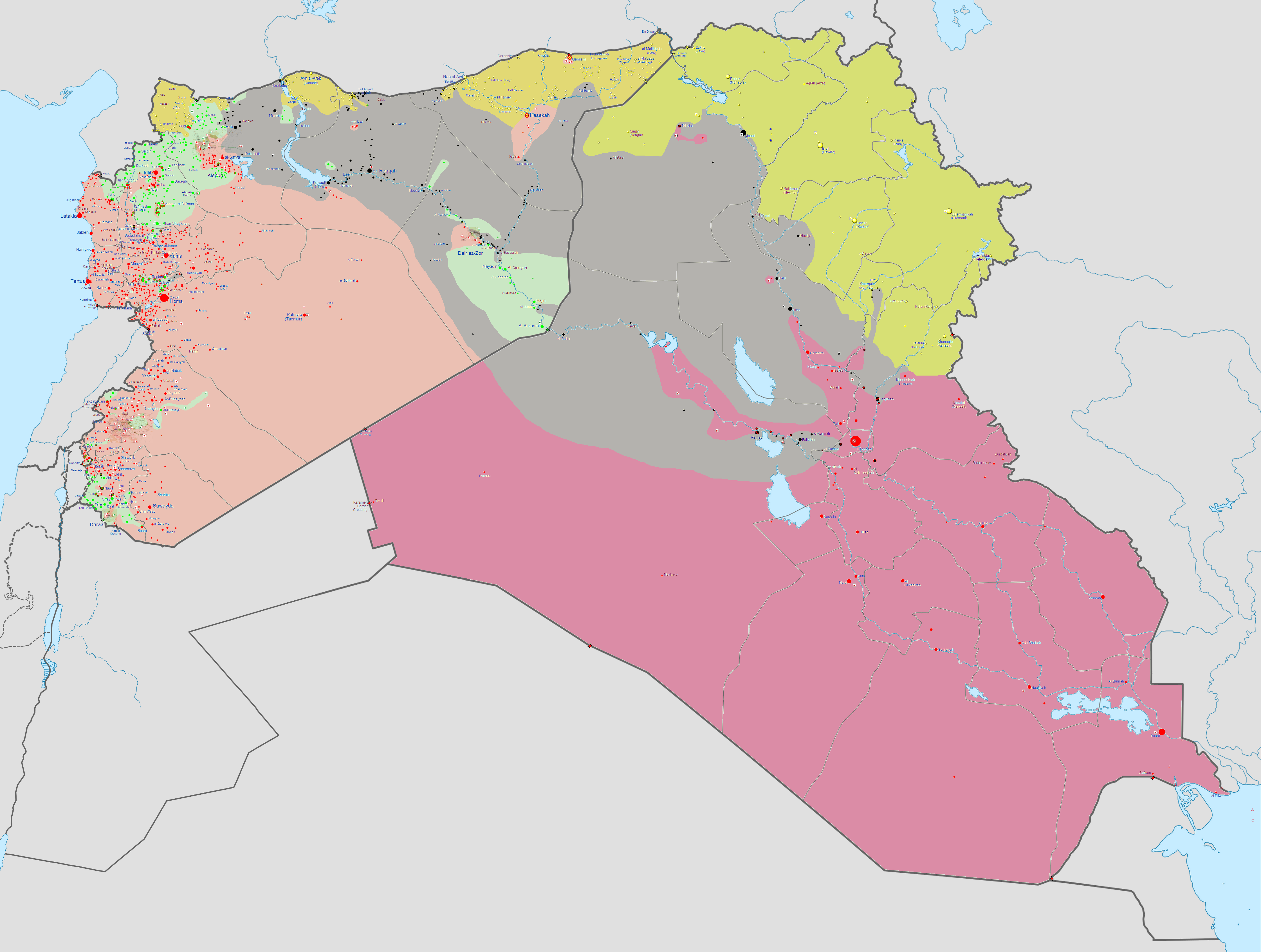You know the drill! Here are some new reports, links and other useful defence and security-related things.
This week news has been dominated by the activities of the Islamic State of Iraq and al-Sham aka ISIS (or is it ISIL? Even media outlets can’t agree, see here). To get up to speed on the extremist organisation, if you’ve got time, here’s a full bibliography on the history and evolution of the Islamic State of Iraq and al-Sham complied by terrorism researcher and Jihadology blogger Aaron Zelin. For ISIS info on the fly, here’s a quick overview of the group’s origins, their links to al-Qaeda and what they want, and another on who’s fighting in Iraq and why. For those more visually oriented, the grey areas in the map above represent areas in Iraq and Syria controlled by ISIS as of June 2014. For more info, see here.
Also on terrorism, here’s the latest infographic via War on the Rocks and National Consortium for the Study of Terrorism and Responses to Terrorism (START) from the latter’s Global Terrorism Database that shows which countries experienced increases or decreases in levels of terrorism between 2012 and 2013. No prizes for the result in Iraq, but France/Corsica warrants a mention for the activities of the Corsican National Liberation Front which, apart from not being a jihadist organisation, committed 50 non-lethal bombings in 2012 but none in 2013.
Turning now to our immediate region, what’s it like to be in the middle of a South China Sea dispute? Here’s the diary of ABC reporter Samantha Hawley who recently spent five days aboard a Vietnamese coast guard vessel traveling to a Chinese oil rig near the Paracel Islands to gain a first-hand view of the tension between regional states.
Meanwhile, Carl Thayer looks at why China, despite insisting on only bilateral solutions, took its dispute with Vietnam to the United Nations. Drawing on Timothy Walton’s study ‘China’s Three Warfares’, he explains that it’s part of an information warfare campaign that lets China ‘have it both ways’: relying on the UN to make its case while simultaneously rejecting UN arbitration.
Need to know who wants/owns what in the South China Sea? Check out this comprehensive 2013 report by CSIS’ Greg Poling (PDF) that lays out each country’s claim. It also contains a useful annex that defines the difference (for legal purposes) between an island and a rock.
As we’re hurtling towards the Indonesian presidential election on 9 July, there’s no shortage of interesting commentary on the future of the country. First is a must-read by ANU’s Ed Aspinall on why the outside world should be worried by the possibility that Prabowo Subianto could be the next president. Next is an RSIS Commentary by Emirza Adi Syailendra on the personalised nature of Indonesia’s post-election foreign policy, but also read Awidya Santikajaya on why there’ll be continuity despite the change in leadership.
Looking north, NBR has just released a new report on the sea change in Japanese foreign policy, in particular, constitutional reinterpretation of Article 9. Kenneth B. Pyle observes that post-Cold War administrations have steadily loosened self-binding policies that ensured Japan could avoid military and political involvement in the Cold War (these policies were known as the Yoshida Doctrine), and significantly:
Beijing’s bluster and bullying are foolishly making Abe’s agenda of sweeping away the remnants of the Yoshida Doctrine much easier. One sees Abe’s goals of a tighter U.S.-Japan alliance and an activist foreign policy in the recent establishment of a National Security Council, legislation to strengthen control of state secrets, repeal of restrictions on exporting weapons and sharing of military-related technology, formulation of long-term strategic priorities, and reworking of defense guidelines to enhance U.S.-Japan military cooperation and interoperability.
Lastly, CIMSEC’s Scott Cheney-Peters recently returned from a trip to India for conference on maritime security that also explored India’s role in the Indo-Pacific. Here’s his rundown of that conference in which China was raised on more than one occasion.
Video
Do ISIS militants threaten the US? Bill Scher and Matt K. Lewis debate the topic de jour, including liberal and neocon perspectives of the Iraq War and whether partition of Iraq is an option.
Events
Next week ANU is hosting a series of four short talks by scholars on the Thai coup followed by a Q/A session on Friday 27 June at 12pm. Speakers are Craig Reynolds, Nicholas Farrelly, Sarah Bishop and Tyrell Haberkorn. The event is free and open to the public, more details here.
Natalie Sambhi is an analyst at ASPI and editor of The Strategist. Image courtesy of Wikipedia.
